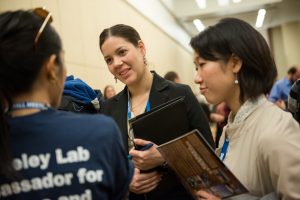February 11, 2019
Survey Says…
Posted by AGU Career Center
For the last five years, the American Geosciences Institute (AGI) has collected data from graduates of geosciences programs about their education and career activities. Some of the most interesting results from the 2016-2017 academic year survey are summarized below.
This year, 513 students (419 bachelor, 58 masters, and 36 doctoral) from 147 schools participated. The demographics have not changed significantly, with 40% or more females at all degree levels, and 12% or fewer underrepresented minorities. However, fewer graduates have provided demographic information in recent years.
Most of the undergraduate students majored in geology, then specialized in a different field upon entering graduate school. Their reasons include intellectual engagement, as in previous years, love of being outdoors and interest in the environment. But this year, being able to help with societal issues and career opportunities were also mentioned by bachelor’s graduates. Master’s level graduates mentioned career opportunities, and PhD level graduates expressed a strong desire to continue research and field work, as well as wanting to help with societal issues related to earth science.
The vast majority (99%) of graduates have participated in at least one field experience, which could have been a field camp (4 or more weeks), field course (at least half time in the field) or field experience (field trip). Employers now expect students to have these experiences, and to have acquired field skills.
Research experiences were queried separately. Only “20% of bachelor graduates and 5% of master graduates did not participate in research” before completing their degree. A surprising finding this year was a “15% decrease in the use of computer-based methods” for self-directed research among graduate students – a number that had been increasing. One possible explanation is that fewer atmospheric science and meteorology students participated than in past years.
Internships are universally agreed to be important for career development, but there has been “a consistent trend of low participation.” In 2017, there was a slight increase in participation across all degree levels (still less than 30%), and 33% of doctoral graduates and 37% of bachelor’s graduates did not even fill out an application. The data suggests that there are two contributing factors – there are not enough internships available, and students have difficulty in finding these programs since there is no centralized list of opportunities. As a result, more internships, and better ways of advertising them to students, are needed.
In 2017, the bachelor’s graduates reported the lowest ever interest in graduate school (35%), while the master’s graduates reached a high point of 31% interested. This could be because many graduate programs are full, and the master’s students who have spent the last two or three years in the academic environment have the connections and/or the encouragement to continue. This year also had the lowest numbers of bachelors (35%) and the highest numbers of master’s graduates planning to immediately attend graduate school.
And now for the bad news – recent graduates at all degree levels are getting hired at the lowest rates since the survey began, continuing a downward trend. In 2014, 70% of doctoral graduates found employment, but this dropped to 36% in 2017. This might be due to a slowdown in hiring in the resources and energy/mining industries, administrative changes leading to uncertainty in environmental regulations thus cautious hiring in the environmental and engineering sectors, and machine learning processes and automation replacing many mid-level skills jobs.
Personal contacts, campus recruitment events, and internet searches were cited as some of the most useful resources for finding jobs. Conference networking was also more useful for master’s and doctoral graduates than in the past.
Data from prior surveys indicated that strong quantitative skills were a good predictor of students receiving and keeping jobs. However, lack of quantitative skills is an issue for many graduates. Forty percent of graduates surveyed did not take a course in statistics, and less than 30% of the bachelor’s graduates took Calculus III, linear algebra, differential equations, or quantitative/computational methods. Even at the PhD level, only slightly more than half of the graduates took any of the advanced mathematics courses. In addition, employers especially seek students with communication, business and finance skills, but these are not taught in traditional geosciences programs.
The full report is available at https://store.americangeosciences.org/status-of-recent-geoscience-graduates-2017.html.
Lisa M. Balbes, PhD, has been a freelance technical writer and editor at Balbes Consultants LLC for over 25 years. She is the author of Nontraditional Careers for Chemists: New Formulas for Chemistry Careers (Oxford University Press).



 On the Job is an AGU blog, that provides career advice and workforce guidance to geoscience students, early-career and established professionals who are interested in pursuing professional enrichment.
On the Job is an AGU blog, that provides career advice and workforce guidance to geoscience students, early-career and established professionals who are interested in pursuing professional enrichment.